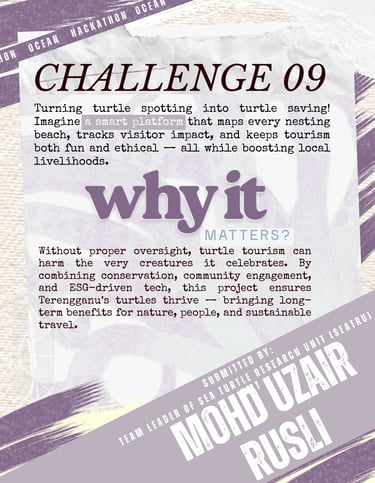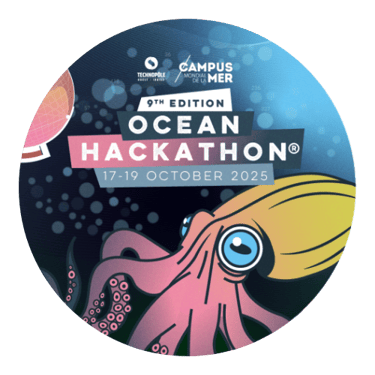Challenge KUL 09 : Turtles & Tourism: A Digital Future
CHALLENGES 2025
8/23/20251 min read


Following Malaysia’s ban on commercial turtle egg sales, Terengganu has seen a rise in turtle-based tourism. This shift offers wider socio-economic benefits but also brings challenges — such as overcrowding at nesting beaches, unsupervised hatchling releases, and "swimming with turtles" — raising concerns about sustainability and ethical practices.
The current challenge is to scale up turtle ecotourism across all 52 nesting beaches in Terengganu, ensuring inclusive economic growth, proper regulation, and increased investor confidence. However, there is no central mechanism to manage product development, track visitor impact, or connect field data with policymaking. SEATRU proposes a Terengganu Turtle Tourism digital framework rooted in ESG (Environmental, Social, Governance) principles.
This platform will:
- Digitally map and monitor turtle nesting beaches and tourism hotspots
- Centralise biological data for policy and research access
- Provide real-time oversight of tourism products and compliance
- Support community-based conservation initiatives backed by corporate partners
- Promote ethical tourism through strategic marketing.
This project aims to integrate conservation with sustainable tourism, creating a model that benefits local communities, attracts responsible investment, and safeguards Terengganu’s marine heritage.
We aim to develop a mobile application that ethically promotes all sea turtle-related tourism products while enabling real-time monitoring of community impact.
Our team requires a multidisciplinary set of skills, including:
1. Marine biologist: to ensure ecological accuracy and ethical considerations in tourism product development.
2. Data science & GIS: to process and visualize biological and tourism-related data for decision-making.
3. Mobile and web app development: to build an integrated platform for product promotion, visitor tracking, and community monitoring.
4. UI/UX design: to create an engaging, user-friendly interface for both tourists and stakeholders.
5. Digital marketing and ESG communication: to promote ethical tourism products and attract corporate partnerships.
6.Community engagement and socioeconomics: to evaluate and enhance local impact, inclusivity, and sustainability.
Essential team skills:
Development Goals for the 48-Hour Hackathon:
About the Challenge :
Connect
Join us in ocean sustainability and innovation.
© 2025. All rights reserved.
